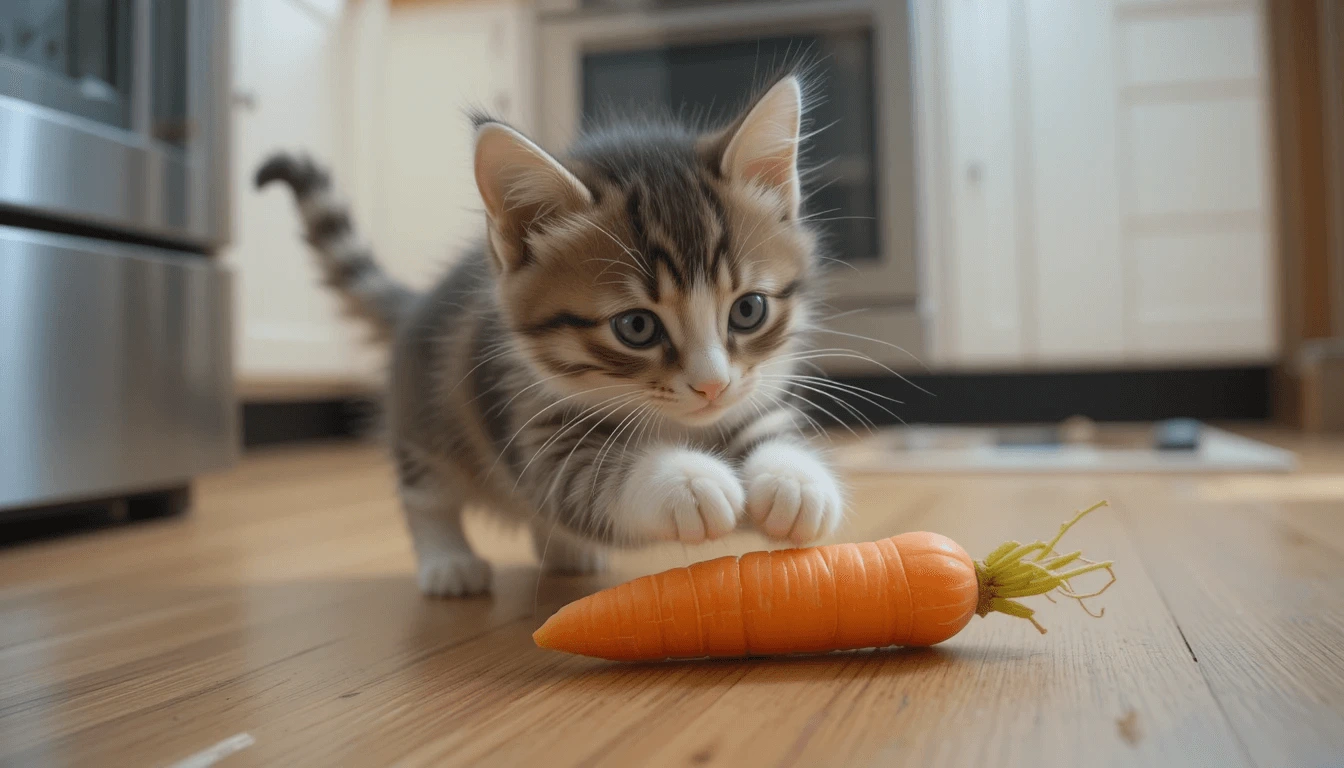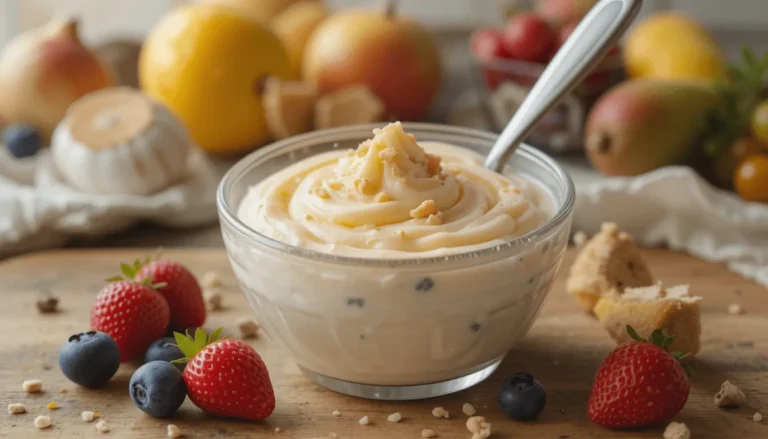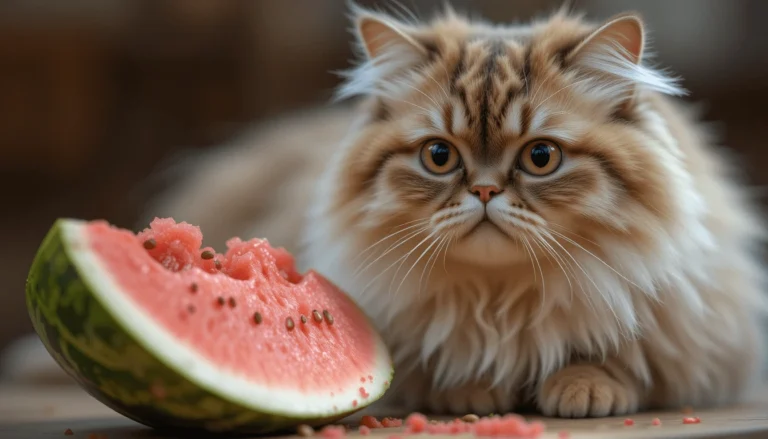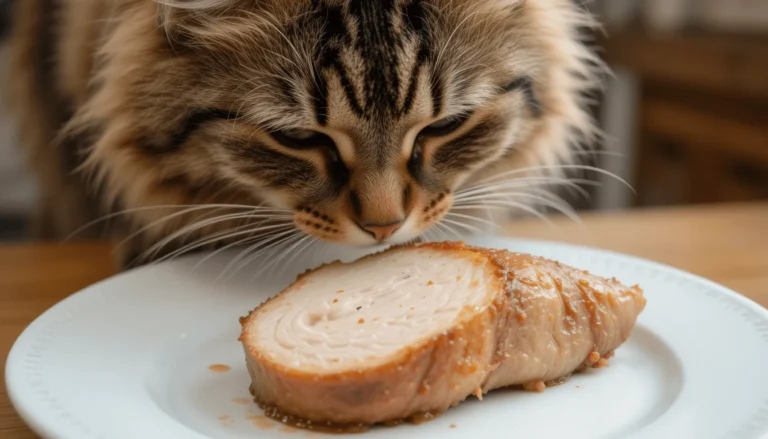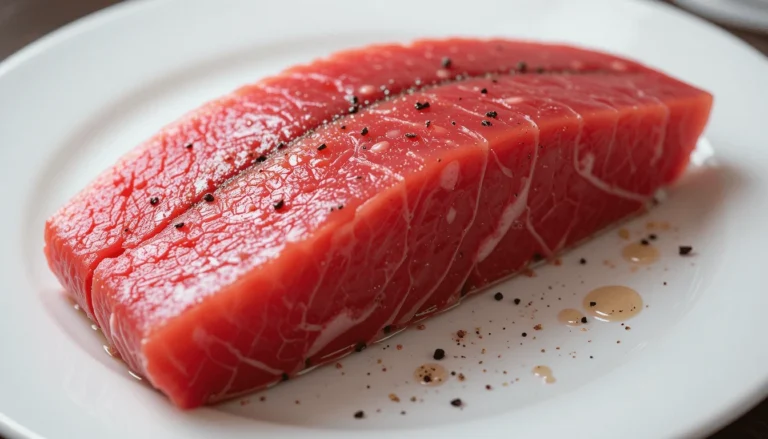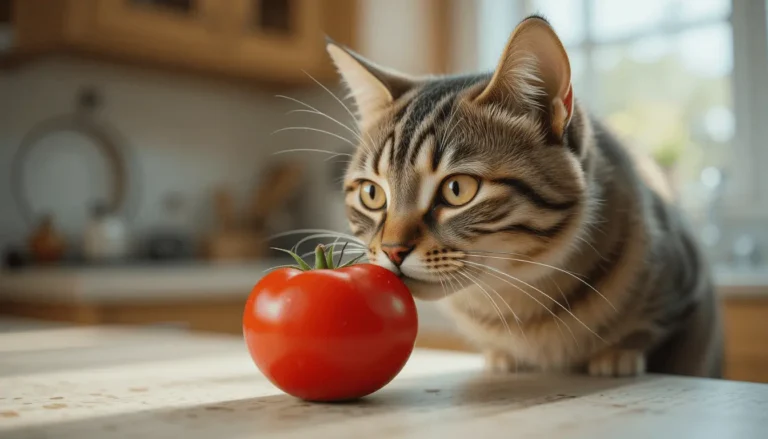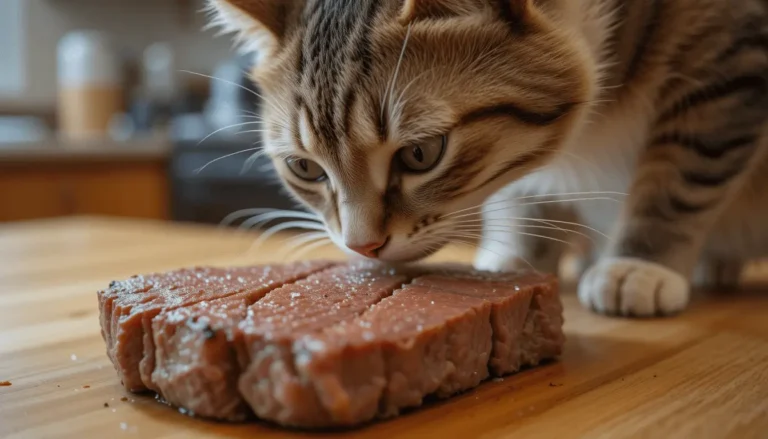Can Cats Eat Carrots? Vet-Approved Safety Guide & Benefits
Introduction
“I’ll never forget the day I caught my mischievous tabby, Whiskers, pawing at a stray baby carrot that had rolled off my dinner plate. Before I could react, he took a curious nibble—and my mind raced: Can cats eat carrots? Was this harmless curiosity, or should I be worried? As a devoted cat parent, I dove into research, consulting veterinarians and feline nutritionists to uncover the truth. Turns out, the answer isn’t a simple ‘yes’ or ‘no.’ While carrots offer surprising health perks for cats, there are also risks every owner should know. Let’s explore the science-backed benefits, potential dangers, and how to safely share this crunchy veggie with your feline friend.”
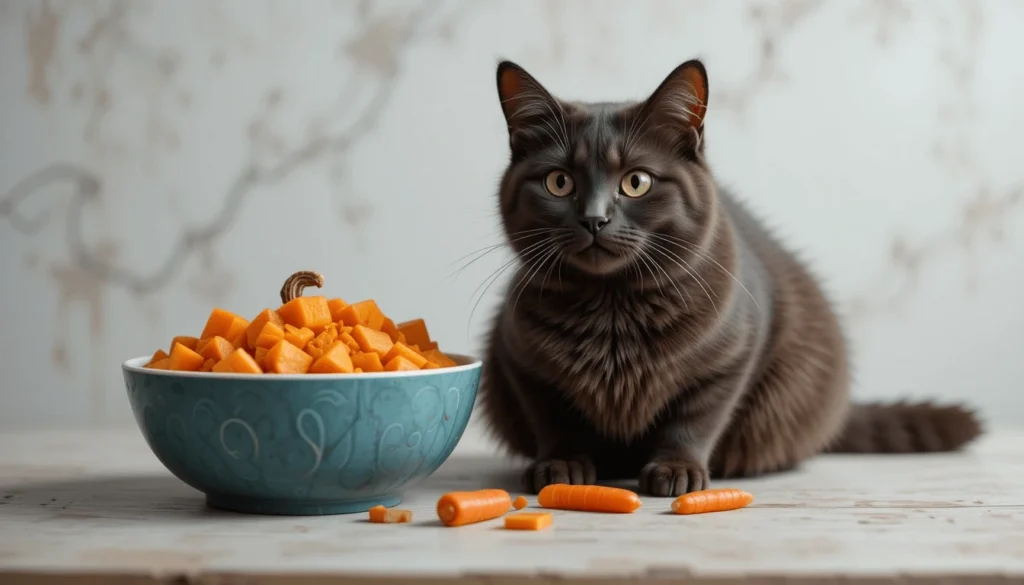
Are Carrots Safe for Cats? What Science Says
As a devoted cat lover, you’ve probably wondered: Can cats eat carrots? The short answer is yes—but with precautions. While cats are obligate carnivores (meaning meat is essential), small amounts of carrots can be a safe, occasional treat. feline responses vary significantly, and proper food preparation plays a crucial role . Let’s dive into the facts.
1. Nutritional Value of Carrots for Cats
Carrots are packed with beta-carotene (which converts to vitamin A), fiber, and antioxidants—nutrients that support feline vision, digestion, and immune health. According to the ASPCA, carrots are non-toxic to cats, making them a safer choice than many human foods. However, cats lack the enzymes to fully break down plant matter, so carrots should only be given in small, well-prepared portions.
Key Takeaway: Can cats eat carrots? Yes, but they shouldn’t replace meat-based meals.
2. Can Cats Digest Carrots Properly?
Unlike humans, cats have shorter digestive tracts optimized for protein, not fiber. While cooked carrots are easier to digest, raw carrots may cause mild stomach upset or blockages if not chewed properly. A study in the Journal of Feline Medicine and Surgery notes that while some cats tolerate veggies, others may experience gas or diarrhea if overfed.
Pro Tip: If your cat has a sensitive stomach, introduce carrots gradually and monitor their reaction.
3. Raw vs. Cooked Carrots – Which Is Safer?
- Cooked (Steamed/Boiled): Soft, easier to digest, and lower choking risk.
- Raw: Crunchy texture may help clean teeth, but poses a higher choking hazard, especially for kittens.
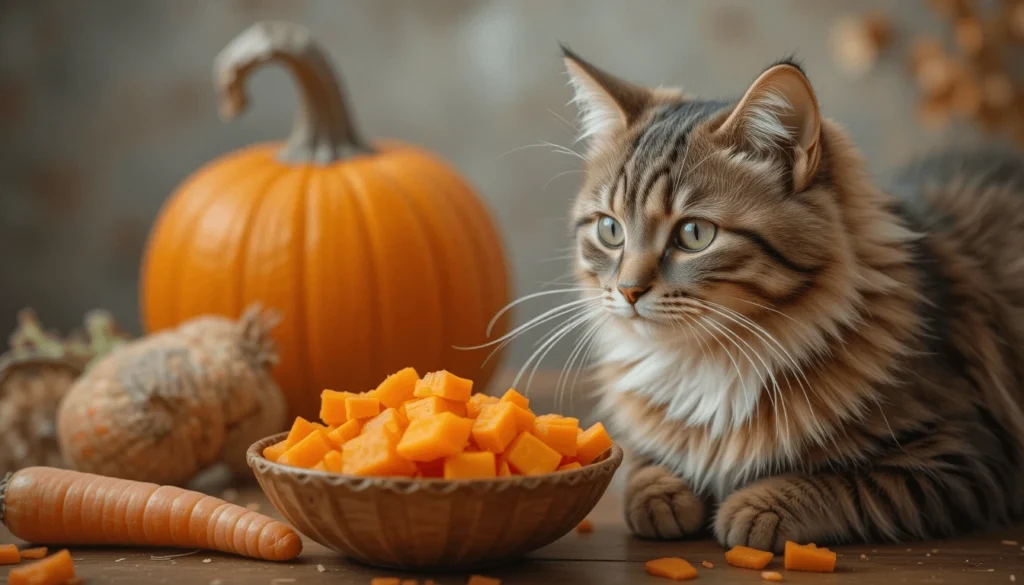
The Cornell Feline Health Center recommends steaming and mashing carrots for safer consumption.
Did You Know? Some commercial cat foods include carrot pulp for added fiber—proof that small amounts can be beneficial!
4. Potential Choking Hazards & How to Avoid Them
Carrots should always be cut into tiny, soft pieces (no large chunks!). A report by Pet Poison Helpline warns that hard veggies can cause obstructions, especially in curious cats who gulp food without chewing.
Safety Checklist:
Dice or puree carrots before serving.
Avoid seasoning (salt, butter, garlic—toxic to cats!).
Supervise your cat during snack time.
Why Cat Lovers Should Care
While carrots aren’t a dietary must, they can add variety to your cat’s diet when served responsibly. Always consult your vet before introducing new foods—especially if your cat has diabetes or kidney issues, as carrots contain natural sugars.
Final Thought: Can cats eat carrots? Yes—but moderation and proper prep are key!
Health Benefits of Carrots for Cats – A Vet-Approved Guide
As cat lovers, we’re always looking for ways to boost our feline friends’ health. So, can cats eat carrots in a way that actually benefits them? The answer might surprise you! While cats don’t need vegetables, carrots offer some unique perks when served properly. Let’s explore the science-backed advantages of this crunchy snack.
1. Supports Eye Health (Vitamin A & Beta-Carotene Boost)
Cats require preformed vitamin A (from animal sources) in their diet, but the beta-carotene in carrots can provide supplemental support. According to Tufts University’s Veterinary Nutrition Team, while cats can’t efficiently convert beta-carotene like humans can, small amounts may still contribute to:
Supporting optimal eye health, particularly in aging felines
Supporting immune function
Promoting skin and coat health
Fun Fact: Many premium cat foods include carrot meal as a natural source of antioxidants!
2. Aids Digestion (The Fiber Factor)
While too much fiber can upset your cat’s stomach, 1-2 teaspoons of cooked, pureed carrots can:
Help regulate bowel movements (great for cats prone to constipation)
Provide prebiotic benefits to support gut health
Add bulk to the diet without excess calories
Important Note: The WSAVA Global Nutrition Guidelines caution that fiber should never exceed 5% of a cat’s daily intake.
3. Low-Calorie Snack for Weight Management
At just 41 calories per 100g, carrots can be a smart treat alternative for chubby kitties. A study published in the Journal of Animal Physiology and Animal Nutrition found that:
Low-calorie veggie snacks helped reduce obesity in indoor cats
The crunch factor satisfies chewing instincts
Helps cats feel fuller between meals
Pro Tip: Replace 10% of your cat’s regular treats with carrot bits to cut calories.
4. Dental Benefits (Nature’s Toothbrush?)
While not a substitute for brushing, the mildly abrasive texture of raw carrots may:
May assist in decreasing plaque accumulation, as recognized by the Veterinary Oral Health Council
Stimulate gums during chewing
Freshen breath naturally
Warning: Only offer raw carrots to cats with strong teeth – kittens and seniors should stick to cooked versions.
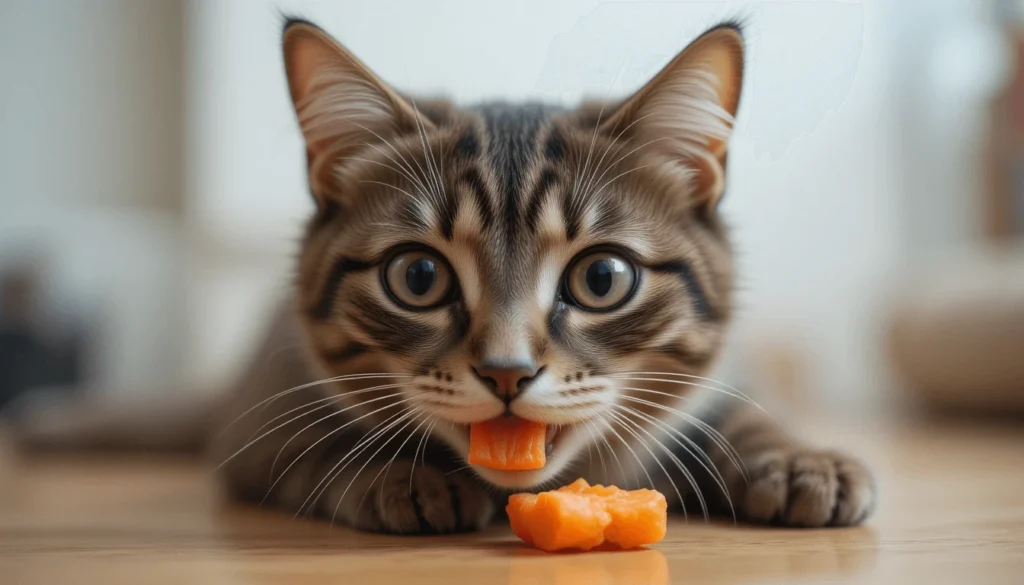
Risks & Precautions Every Cat Owner Should Know
Before you start chopping carrots for your feline, let’s address the elephant in the room: can cats eat carrots without any risks? While generally safe, there are important exceptions and precautions to consider.
1. The Sugar Content Concern
Carrots contain 4.7g of sugar per 100g – not much for humans, but significant for cats. The American Association of Feline Practitioners warns that:
Diabetic cats should avoid carrots
Frequent inclusion in their diet could lead to gradual weight accumulation
Some cats develop a taste for sweets, leading to picky eating
Safe Serving: Limit to 1-2 small pieces (about 1/2 teaspoon) 2-3 times weekly.
2. Allergic Reactions – Know the Signs
While rare, some cats may show:
Skin irritation or excessive grooming
Digestive upset (vomiting/diarrhea)
Swelling around the mouth
Action Plan: Introduce carrots alone (no other new foods) and monitor for 24 hours.
3. Carrot Tops – Safe or Dangerous?
Those leafy greens might look appealing, but:
Can cause stomach upset due to high fiber
May contain pesticides if not organic
Some cats find the smell unappealing anyway
Vet Verdict: PetMD recommends sticking to the orange root portion only.
4. Special Cases: Cats With Health Conditions
Check with your vet first if your cat experiences any of these conditions:
Kidney disease (due to potassium content)
Diabetes (sugar concerns)
History of intestinal blockages
Expert Insight: The Cornell Feline Health Center suggests that for most healthy cats, occasional carrot treats pose minimal risk when properly prepared.
How to Serve Carrots Safely – A Step-by-Step Guide
Now that we’ve answered “can cats eat carrots?”, let’s turn to the fun part – how to actually serve them! Follow these vet-approved methods to make carrot time both safe and enjoyable.
1. Proper Preparation Methods
Steamed & Mashed: Retains nutrients while being easy to digest
Puréed: Mixes well with wet food (great for seniors)
Baked Chips: Thin slices baked until crisp (no oil/salt)
Raw Chunks: Only for cats with excellent chewing habits
Pro Tip: Chewy’s Veterinary Council recommends cooking until carrots are “mushable” between your fingers.
2. Serving Size Guidelines
Based on a 10-pound cat:
Cooked: 1-2 teaspoons, 2-3 times weekly
Raw: 1-2 thin slices occasionally
Never exceed 10% of daily calories from treats
Visual Guide: One baby carrot equals about 4 servings for an average cat!
3. Creative Serving Ideas
Food Topper: Sprinkle grated carrot on meals
Frozen Treat: Blend with chicken broth and freeze
Training Reward: Tiny diced pieces for positive reinforcement
Cat Mom Hack: Try mixing with a favorite protein (like salmon) to increase acceptance.
4. Alternatives If Your Cat Hates Carrots
If your feline turns up their nose, try these safer veggie options:
Cooked green beans
Steamed zucchini
Baked pumpkin (not pie filling!)
Final Thought: Remember that every cat is unique – what works for one may not work for another. The key is patience and observation!
Conclusion
After exploring the benefits, risks, and best practices, we’ve arrived at the purr-fect answer: Yes, cats can eat carrots—in moderation and when prepared safely! While they’re not a dietary necessity, carrots can offer some nutritional perks as an occasional treat. Remember:
Cooked & mashed is safest for digestion
Small, carefully measured servings help avoid both choking risks and digestive discomfort
Carefully observe your cat for any signs of intolerance or negative effects.
For cats with health conditions or picky eaters, consult your veterinarian before introducing new foods. The ASPCA’s list of safe people foods is a great resource, and the Cornell Feline Health Center offers expert guidance on feline nutrition.
At the end of the day, every cat is unique—some may love the crunch of a carrot piece, while others will sniff and walk away. So why not offer a small, properly prepared piece and see what your feline food critic thinks? 
Final Thought: Carrots can be a fun, low-calorie snack for many cats—but since they don’t need them, the real question is… does your cat actually like carrots? 

FAQs
1. Can cats eat raw carrots?
Yes, but with caution. Raw carrots are harder to digest and may pose a choking hazard, especially for kittens or older cats. The American Veterinary Medical Association (AVMA) recommends steaming or boiling carrots to soften them before feeding. If offering raw, always cut into tiny, thin pieces and supervise your cat.
Pro Tip: Try grating a small amount of raw carrot over your cat’s food for added texture—some felines love the crunch!
2. How much carrot can I give my cat?
For an average 10-pound cat:
Cooked carrots: 1–2 teaspoons, 2–3 times per week
Raw carrots: 1–2 very thin slices occasionally
The Pet Nutrition Alliance advises that treats (including veggies) should never exceed 10% of your cat’s daily calories. Overfeeding carrots may lead to digestive upset or weight gain.
3. Are carrot tops (greens) safe for cats?
While not toxic, carrot greens are not recommended. They’re high in fiber and can cause:
Stomach upset
Potential pesticide exposure (unless organic)
Unpleasant taste (most cats dislike them)
The ASPCA Animal Poison Control suggests sticking to the root portion only.
4. Can kittens eat carrots?
Kittens can try small amounts of well-cooked, mashed carrots after 4–6 months of age. However:
Their primary diet should be kitten-specific food
Always consult your vet first
Avoid raw carrots (choking risk)
According to International Cat Care, kittens’ digestive systems are more sensitive, so introduce new foods very gradually.
5. Do carrots help with cat hairballs?
Possibly! The fiber in cooked carrots may:
Support digestion
Help move hair through the gut
However, the Cornell Feline Health Center notes that specialized hairball formulas or regular brushing are more effective solutions.
6. Can diabetic cats eat carrots?
Not recommended. Carrots contain natural sugars that can spike blood glucose levels. The American Association of Feline Practitioners (AAFP) advises diabetic cat owners to avoid starchy vegetables and stick to protein-rich treats.

